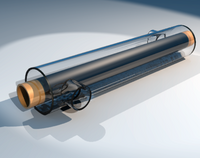
Photo from wikipedia
Physiological changes associated with thermoregulation can influence the kinetics of chemicals in the human body, such as alveolar ventilation (VA) and redistribution of blood flow to organs. In this study,… Click to show full abstract
Physiological changes associated with thermoregulation can influence the kinetics of chemicals in the human body, such as alveolar ventilation (VA) and redistribution of blood flow to organs. In this study, the influence of heat stress on various physiological parameters was evaluated in nine male volunteers during sessions of exposure to wet blub globe temperatures (WBGT) of 21, 25 and 30°C for four hours. Skin and core temperatures and more than twenty cardiopulmonary parameters were measured. Liver, kidneys, brain, skin and muscles blood flows were also determined based on published measurements. Results show that most subjects (8 out of 9) have been affected by the inhalation of hot and dry air at the WBGT of 30°C. High respiratory rates, superficial tidal volumes and low VA values were notably observed. The skin blood flow has increased by 2.16-fold, whereas the renal blood flow and liver blood flow have decreased by about by 11 and 18% respectively. A complete set of key cardiopulmonary parameters in healthy male adults before and during heat stress was generated for use in PBPK modeling. A toxicokinetic studies are ongoing to evaluate the impact of heat stress on the absorption, biotransformation and excretion rates of volatile xenobiotics.
Journal Title: Canadian journal of physiology and pharmacology
Year Published: 2021
Link to full text (if available)
Share on Social Media: Sign Up to like & get
recommendations!